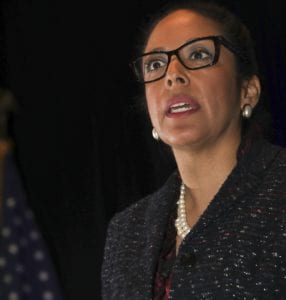Who is a member?
Our members are the local governments of Massachusetts and their elected and appointed leadership.

2019 Keynote speaker Anna Maria Chávez. See the full video of her address below.
Anna Maria Chávez learned about the power of local government and the importance of leadership as the daughter of a Mexican-American woman who ran for the local school board in the farming town of Eloy, Arizona.
The former Girls Scouts CEO told more than 1,000 local officials during the MMA’s Annual Meeting on Jan. 19 that she also learned during her childhood about the “underbelly of leadership” – the hardships faced by her mother – and that all people endure when they stand up to lead. This, she said, is why the leaders of today must encourage and support leaders of tomorrow from all backgrounds and walks of life.
“You can’t be what you can’t see,” she said, as a way of illustrating how people of diverse backgrounds can be inspired when they see leaders who look and sound like them.
Chávez’s mother was among a group of women who presented draft language for a proposed Equal Rights Amendment to the White House at a Rose Garden ceremony in the 1970s. Chávez also remembers being at an event where her mother was speaking and seeing a man stand up and yell at her father, “Get your wife off that podium.” Years later, she found out that weeks after that meeting, while discussing a contentious issue in a public forum, someone fired a shot at her mother, luckily missing her. But her mother pressed on.
The push for diversity and inclusion can make people uncomfortable because it signals a shift in power, Chávez said. On this point, she related advice her mother gave her: “You were given an opportunity to be born into a society that allows people to grow and lead regardless of your background. … Our job is to make sure other people have the ability to live the American Dream.”
Chávez learned that leadership starts at home, with what boys and girls hear around the kitchen table. The person with the most influence on whether a young girl goes on to what have been considered nontraditional careers for women – such as science, technology, engineering and mathematics – is her father.
Chávez pointed to Nancy Eddy, the first president of the MMA and a former Amherst selectman who was honored before the keynote address – “Hashtag #girlcrush,” she said – and recalled reading that now-retired Congressman John Olver had to ask Eddy seven times before convincing her to run for the Board of Selectmen.
“Nancy, she’s a beacon, not only for women but for men who perhaps don’t have those role models in their life, or that gay person who wants to be at the forefront of issues but feels uncomfortable stepping forward as an authentic leader,” Chávez said.
This encouragement and support is a matter of moral leadership, she said. But the push for diversity and inclusion is also pragmatic and results-based. Research shows, for example, that companies that practice diversity and inclusion outperform other companies by 15 percent, she said.
“It’s not about race or color or gender – it’s about the fact that we need great leaders,” she said. “And what I found working for great leaders is they know that it takes a diverse team to get things done.”
Through her work with the Girl Scouts, Chávez realized that the discussion about diversity and inclusion must start with education, because, in many cases, people have not been introduced to the data about investments in young women or the effectiveness of diverse teams.
“Sometimes we offend people because we don’t know how to have the conversation,” she said. “I want to empower you with the ability to do that because you’ve got to lead it, because it’s a matter of moral leadership in the United States today.”
Chávez, named one of the “World’s Greatest Leaders” by Fortune magazine, is now executive vice president and chief growth officer at the National Council on Aging. She worked closely with local officials as Arizona’s director of intergovernmental affairs, and held several posts in President Bill Clinton’s administration.